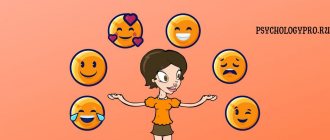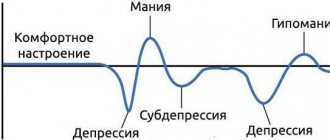Emotions accompany a person every second of his life. Sometimes they turn out to be pleasant and serve a supportive function, and sometimes they completely take over the entire thought process, making it impossible to adequately perceive reality. And in each individual case we are talking about the interaction of emotions and intellect. However, there is also such a thing as “emotional intelligence”.
Intelligence is a person’s ability to think, solve problems, process information and use new experiences for self-development. While emotions are responsible for changes in mood that are caused by external factors and stimuli. For example, bad news causes irritation and anxiety in a person, and upcoming good events invariably cause excitement. All these are factors to which the human body adapts.
A person can not be led by emotions and use them for his own benefit thanks to emotional intelligence. This term (from the English emotional intelligence) means a person’s skill in which he is aware of emotions, can manage them and even read them from himself to everyone who is part of his daily environment.
Emotional intelligence as a concept
The concept of emotional intelligence was introduced in the late 90s by US psychologist Daniel Goleman. But even before the official recognition of this term, there was also the term “social intelligence”, which meant the ability of people to adapt to their environment and calmly perceive their interlocutors, being able to hide some emotions and see what the mood of others is.
Research conducted by Goleman has shown that people who have developed emotional intelligence have good mental health, have leadership skills and are highly effective workers. At the same time, emotional intelligence is responsible for leadership skills. In professions that are directly related to stress, the ability to cope with one’s own emotions and high emotional intelligence are sometimes valued above any other knowledge.
“Change your attention and you change your emotions. Change your emotions and your attention will change.”
Frederick Dodson
How to measure your EQ
To determine your level of emotional intelligence, you need to analyze your behavior. It's worth considering a low EQ if you:
- you are constantly offended and do not know how to forgive others;
- you often think that you are misunderstood;
- can't cope with stress;
- you don’t understand what you feel and why;
- criticize others and argue to no avail;
- you are afraid of change and take a long time to adapt to new things.
These are general signs, and almost anyone can recognize themselves in them, so psychologists are trying to figure out how to digitize a person’s emotions and create the most objective test possible, as they did with IQ. At the moment, the most popular way to change EQ is the MSCEIT (The Mayer-Salovey-Caruso Emotional Intelligence) technique. It helps measure emotional skills and consists of 141 questions. The subject is shown pictures with emotions that need to not only be identified, but also explained. If you don't have time for serious research, take our five-minute test. We don’t promise an objective result, but it will be funny.
What does emotional intelligence mean in psychology?
Today, thousands of experts consider emotional intelligence as one of the most powerful human abilities. It can be easily corrected and developed, even if initially poorly developed.
Throughout the psychological research of the 20th century, several theories about emotional intelligence have appeared. The creators, leading psychologists in the world, described the main factors that are responsible for the symbiosis of intelligence and emotional state.
Goleman's model of emotional intelligence
Daniel Goleman divides emotional intelligence into 4 components:
- Self-awareness. This is a skill that allows you to analyze human emotions and intuition. This is an awareness of which aspects of the personality are considered strong, and where the limit of possibilities is. In addition, self-awareness is characterized by a feeling for oneself and a real appreciation of one’s talents.
- Self-control. This component of emotional intelligence includes the ability to take control of destructive emotions and impulses. People with self-control are able to quickly adapt to any situation, know how to seize opportunities, have reliability and honesty, and the ability to positively assess current events.
- Social sensitivity. This component manifests itself in a special talent - to hear the feelings of others, to take their place and take part in their lives and help them. For people who are in leadership positions, sensitivity is also manifested in understanding the hierarchy in the team and the ability to satisfy the requirements of customers or subordinates
- Relationship management. This component of emotional intelligence is characterized by a trait in which a person motivates others and can force anyone to follow him. Such people have the gift of persuasion, the ability to quickly resolve disagreements in a team, maintain social connections and create teams of like-minded people.
Read more: Attention - properties and features
Goleman's model shows how important it is to encourage a person to develop his personal qualities, which subsequently contribute to achieving success in many areas.
Emotional intelligence in the Mayer-Salovey-Caruso model
US specialists Mayer and Salovey Caruso have developed their own model of emotional intelligence. Work on it has been going on for many years. But the result was a new theory that includes four components.
- Emotion assessment and perception. The authors of the concept believe that this is the essence of the development of emotional intelligence, which lies in the ability to distinguish between emotions and understand their content. To confirm their theory, psychologists gave an example of the expression of sadness or happiness on the faces of other people. These expressions are the same for all people, which means they can be recognized. Children's emotions are easy to read because they have not yet learned to hide them. Adults try to hide all emotional manifestations, but microexpressions can still give them away.
- Using emotions for self-efficacy. According to psychologists, this component consists of recognizing the power of emotions and using them to your advantage. A person learns to maintain concentration on his main tasks. With a positive attitude towards them, a person begins to work more effectively. Even a person's brain becomes more active if a person has a positive attitude.
- Understanding the emotional background. This is a person’s ability to see the cause and source of a particular emotion, to realize the difference between thoughts and emotional impulses and emotions. According to the authors of the concept, it is important for a person to learn to perceive any emotion as a data carrier. If a person is constrained by fear, he can choose how to react to it - attack, freeze with fear, or run away from it. Some emotions can be transformed. A person can also notice how to change the sensory mood with the power of thought
- Emotional background assessment. It consists in the fact that a person uses emotions as steps to achieve personal results. But in order to begin to control the emotional mood, both your own and that of other people, you need to be in a constant state of awareness; it will allow you to remain calm and observant.
In psychology, emotional intelligence is considered along with another concept that studies the relationship between the mind and emotions. It is called the emotionality coefficient, or emotional quotinent. It was introduced by psychologist and journalist Ruven Bar-On.
The scientist presented a whole structure, which consists of a symbiosis of features. All of them together become the determining factor in how a person will behave in the future. Bar-On took IQ as an example and designated the emotionality factor with the letters EQ.
The Ruven Bar-On model includes several main components:
- self-knowledge;
- people interaction skills;
- the ability to adapt to different circumstances;
- the ability to easily get out of stressful situations;
- ability to control mood.
Emotional Intelligence: The Missing Link to Success
If you remember your graduating class, you were probably interested in the successes of your former classmates. What happened to the smartest students? Have they reached great heights? You may also remember a classmate who didn't get good grades and has now started his own company. Even if you don't have real-life examples, you've probably heard similar stories from your friends. No one could imagine that this inveterate C student would be a successful and pleasant person ten years later.
We all know that it is difficult to identify real talent in the primitive school model of measuring achievements. We also subconsciously understand that there is a big difference between being smart in the classroom and being smart in real life. The world is constantly changing (the modern world especially), but who or what taught us to be flexible? We acquired knowledge that seemed unshakable, and after a few years we realized that it did not help us either earn money or be happy.
Thomas Stanley's book The Millionaire Mind contains the results of a survey of 733 US multimillionaires. They were asked to rate the factors that made them successful. Here are the first five leading factors:
| 1 | Honesty to other people. |
| 2 | Discipline. |
| 3 | Ability to get along with people. |
| 4 | Spousal support. |
| 5 | High work capacity. |
All five factors are reflections of emotional abilities.
There is one more question that needs to be answered.
What is success?
Let's define success as “the ability to set and achieve personal and professional goals.” However, of course, everything is not so simple.
Personal definitions of success are completely natural and change over time. We pursue different goals due to age, gaining more and more experience. Youthful idealism turns into an adult awareness of reality and the need for compromise. Having become wiser, we understand that success is only such when it comes to us in different areas. Different aspects of life set their own conditions.
| ✔ | What role are you currently playing? Employee, leader, parent? |
| ✔ | Do you want to earn more money as you move up the corporate ladder, or enjoy your family life? |
We cannot ignore society’s concepts of success. For a long time, a person’s financial situation was considered an indicator of success in life. We all know the question “If you are so smart, then why are you so poor?” This approach to success could not bring anything good. We return again to the wheel of life: modern man understands more and more clearly that the concept of success is distorted and misunderstood. Happiness is formed not only by wages and an expensive car, but also (and most likely primarily) by personal and family relationships, physical health, universal recognition, and a sense of the significance of one’s activities.
Why emotional intelligence is important
Self-control in a world where a person is constantly accompanied by stress is a very important property. But many people get stuck at a level where emotions take precedence over reason, depriving a person of the ability to reason sensibly. And if children can be taught from infancy the skills of understanding feelings and managing emotions, then developing the emotional intelligence of adults is a more labor-intensive process. And it is important to start with the separation of feelings and emotions.
Read more: What is laziness
| Emotions | Feelings |
| An emotion is a short-term impulse with which a person reacts to external stimuli. Minor troubles cause equally minor outbursts of emotions. They flare up like a match and instantly burn out, giving way to other emotions. | Feelings are a long-term and stable attitude towards a phenomenon or person. Feelings tend to establish a close emotional attachment to an object or phenomenon, which can last for quite a long time. |
| Emotions cannot always be understood. Sometimes a person cannot understand exactly what emotion he is feeling. Often this is a whole set of different shades of the same condition. | Feelings always have a clear awareness and description. A person always understands that friendship is friendship, happiness is happiness, and love is love. |
| Emotions are difficult to hide and control. An unexpected outburst of anger or fear is sure to be reflected on the face, even if the person does not want to show it. | Feelings arise in the depths of consciousness and exist there, invisible to others. A person can hide and control them. |
Emotional Intelligence Skills, Structure and Functions
What components need to be pumped up to get this or that result.
For example, if you are afraid of a crisis, we will improve your management of emotions - this will give you confidence, and in the event of a crisis, it will allow you to act more effectively.
A historical example is Henry Ford - failures with his first car models, his first factories - would have lowered not only the mood, but also the motivation, the desire to act.
But it was his resistance to stress and ability to manage emotions that allowed him to find solutions and even develop new strategies for capturing the market. When you read the biographies of such people, you get the feeling that they are some kind of titans, however, the point is simply in the developed skill of EI.
So, a table of skills and functions.
| Capabilities | Components of Emotional Intelligence (skills) | Functions of emotional intelligence |
| Cognitive abilities |
| Interpretative function - allows a person to productively decipher emotional information (facial expression, voice intonation, etc.), which will lead to the accumulation and systematization of knowledge, the formation of one’s own emotional experience. |
| Emotional abilities |
| Regulatory function - promotes a state of emotional comfort and ensures the adequacy of the external expression of a person’s emotions. |
| Adaptive abilities |
| Adaptive and stress-protective functions consist of updating and stimulating a person’s mental reserves in difficult life situations. |
| Social abilities |
| Activating function - provides a flexible ability to find a common language in communication. |
Important: Goleman structure - discussed here.
Components of emotional intelligence
When starting to study your own emotional intelligence, it is worth remembering that it is divided into two types: intrapersonal and interpersonal intelligence.
Intrapersonal intelligence
Essentially, this is a series of characteristics by which one can determine how a person treats himself:
- Self-awareness is the search for one’s personal abilities, awareness of the strengths and weaknesses of personality that affect others.
- Self-regulation. It lies in the ability to manage your emotional states and be able to focus on them. In addition, this skill allows you to quickly cope with stress and find solutions to complex issues.
- Self-motivation. This is the ability to recharge internally to achieve goals and the ability to maintain strength, perseverance and a positive mood when achieving a goal.
- Self-reinforcement. It consists of a good perception of oneself under any circumstances. The ability to praise yourself, your own personality and come up with rewards for yourself, always keeping a positive attitude in life in your soul.
Interpersonal or intrapersonal intelligence
This is, in fact, a whole set of skills and various abilities that form a person’s relationship with others. Basic skills:
- Empathy. It lies in the ability to hear and understand the emotions of others, to understand the motives of actions and to empathize with them. Empathy allows you to suppress conflicts before they arise. This skill is not innate; it is taught from childhood. Mandatory conditions for its development are to perceive people as they are, while being able to imagine oneself in the role of another person, without dissolving in him and maintaining one’s own individuality.
- Social skills. They allow you to positively communicate with other people, regardless of their assessments, without succumbing to rumors and their attempts to change your own decision. Also, these skills allow a person to maintain a positive attitude towards himself and protect his own interests in a conflict situation.
Needs and desires
An emotionally intelligent mind can differentiate between things they need and things that would be nice to have. Needs according to Abraham Maslow's hierarchy are ordinary things like safety, survival and means of survival. Once these things are in place, you can move on to the rest of your needs and desires, of course.
“I want” is a big house, a beautiful car and even a new iPhone. We don't need these things to survive, but rather we want them because of our personal desires and what we think is important to society. Become knowledgeable about what you really need to live, achieve your goals, and support yourself and those around you. Make sure you have a clear distinction between what you need and what you want.
Emotionally intelligent people differentiate between these things, and establish needs before satisfying wants.
Levels of Emotional Intelligence
Each person’s level of emotional intelligence depends on the conditions of growing up, upbringing and family relationships. There can be no average values here. That is, intelligence can be either high or low. These levels are determined using the following characteristics.
A person with high emotional intelligence:
- is aware of his own emotions and can interpret them;
- knows how to behave in such a way that his emotions do not hurt others;
- strives to develop and develop inner peace;
- knows how to create a motivational mood.
Read more: Developing thinking
A person with low emotional intelligence:
- not confident in one's abilities;
- irritable and conflicted;
- does not know how to restrain emotions;
- strives to keep everyone and everything under control.
If characteristics from the second list predominate in a person’s life, this is a clear signal to begin developing oneself.
Difference between IQ and emotional intelligence
What is IQ? Simply put, it is a measure of a person's intellectual, logical, analytical and thinking abilities. IQ deals with spatial, verbal, mathematical and visual skills.
Intelligence quotient is measured quantitatively and determines how easily we learn new things, how we retain and recall information, how to concentrate on exercises and tasks, how to handle numbers, engage in the thinking process, solve problems, and think abstractly and analytically. If your intelligence level is greater than 100, it means that you are quite successful in all of the above skills. Everyone knows people who succeeded in this test and yet are completely unsuited to life.
We in no way want to say that IQ has no significance for a person's success in life. All of these skills are incredibly important: it means that your brain is constantly developing and you are able to find unexpected solutions.
However, whether you like it or not, in addition to your brain, you have a nervous system. And the brain itself performs not only mathematical tasks, it is also capable of experiencing emotions. And this is where serious problems arise. You can have the highest level of intelligence on the planet, but it will mean absolutely nothing if you cannot cope with your psychology, your emotions.
If you've seen the movie Good Will Hunting, you might be convinced that even a child prodigy will work as a janitor if he doesn't want to succeed in life. Matt Damon's character simply doesn't know how or doesn't want to motivate himself to succeed in life. There are other examples in life: an incredibly smart person cannot achieve anything serious in life, despite the fact that he passionately desires it. Both examples talk about the importance of emotional intelligence.
We're all excited about the news we already knew instinctively: IQ isn't the only factor in achieving success. Of course, we must develop our intellect, but beyond this we desperately need good emotional abilities.
Answer yourself this question: which designer (musician, surgeon, businessman, marketer) will achieve more in life, all other things being equal, but with different levels of emotional intelligence? For example, let's imagine that you are a designer and you are trying to get a job. You have a competitor who has identical professional skills to you. The only difference is that you are optimistic, full of enthusiasm, know how to find a common language with clients and your future boss, are tactful and resistant to stress.
So who will get the job? Who will move up the career ladder? Put yourself in the boss's shoes. Who will you hire, all other things being equal? A pleasant professional or an unpleasant professional? Moreover, even those people whose professional level is lower than that of their competitors achieve success.
Yes, there are professions for which the level of emotional intelligence is not particularly important. For example, a cleaner or a builder. In these professions, professional and technical skills are more valued; no one will necessarily demand that you interact effectively with people.
These people are quite capable of doing their work well, some of them earn good money and they have many benefits for a good life. But what about love and friendship relationships? What about understanding other people's emotions so you can help them cope? People with low emotional intelligence can be successful in their jobs, but when they first encounter problems, they experience incredible difficulties. If such a person is fired from his job, he will be subject to extreme stress and become depressed. He may go to several interviews in a row, fail and be frustrated.
Have you ever heard of the wheel of life? This is a technique for determining personal priorities that teaches us one important idea: the number of hours allocated to one area of life affects its quality. You can spend all your time developing technical skills, but at the same time other aspects of your life will begin to sag - health, family, recreation, friends, hobbies, self-development. You simply cannot be happy if you succeed at one thing. Great, truly great people were happy because they knew how to find the right balance.
A person cannot be satisfied with life if he does not take control of his emotions and cannot use them for his own benefit. He will work for a paycheck, spend money on things that he thinks will give him a feeling of happiness, but will feel depressed and irritable.
External factors will never make a person happy; happiness always comes from within. To enjoy life, you need to change, if not your psychology, then at least take control of your emotions.
After all, what exactly is depression? It is rarely physical, but rather a state of thoughts and emotions. You experience negative emotions and have thoughts that reinforce your mood. Or, on the contrary, you repeat the same unpleasant thought over and over again, due to which this repetition causes a negative emotion in you. This emotion stretches over time and you end up in a bad mood. Then there is melancholy, depression, a feeling of worthlessness, and lack of self-confidence.
The way our world is structured is that we are attracted to cheerful, optimistic people, and not to irritated and eternally dissatisfied people. Why? Emotions act like a virus; the influence of another person on our emotions cannot be overestimated. If we communicate with a gloomy pessimist for a long time, this mood is transmitted to us. When we deal with a pleasant, personable person, we feel better. A person who can solve logarithmic equations commands respect, but if he spoils your mood with his presence, you will want to stay away from him.
We can draw a simple conclusion: the symbiosis of IQ and EQ will allow a person to achieve significant success. If you know how to think logically, analyze information and at the same time get along with people, know how to motivate yourself and them, then you will probably succeed.
How to use emotional intelligence
High emotional intelligence allows a person to control the entire sensory and emotional component of life. In this way, a certain balance arises. It allows a person to achieve results in all areas of life, while maintaining a sense of stability, good relationships with others and a positive attitude.
Possessing emotional intelligence allows you to keep all events and circumstances in life under control. There is a simple way to check whether this level is high. People exhibiting high EQ exhibit:
- confidence;
- curiosity;
- awareness of intentions;
- self-control;
- creativity;
- the ability to maintain communication, improve connections with people, develop empathy and love for others.
With these skills, you can use emotions as a tool to build connections and improve your sense of self.
Mixed Goleman model
The model presented by Daniel Goleman focuses on EI as a broad range of competencies and skills that determine leadership effectiveness.
Goleman's theory identifies five main constructs of EI:
- Self-awareness is the ability to know your emotions, strengths, weaknesses, motivations, values, and goals and recognize their impact on others, using intuition to make decisions.
- Self-regulation - involves controlling or redirecting destructive emotions and impulses and adapting to changing circumstances.
- Social skills - managing relationships to get along with others
- Empathy—considering other people's feelings, especially when making decisions
- Motivation is the awareness of what motivates them.
Emotional abilities are not innate talents, but rather learned abilities that need to be worked on and developed to achieve extraordinary results.
Two measurement tools are based on Goleman's model:
- The Emotional Competence Inventory (ECI), which was created in 1999.
- The Emotional and Social Competence Inventory (ESCI), a new edition of the ECI, was developed in 2007.
These instruments, developed by Goleman and Boyatzis, provide behavioral assessments of emotional and social competencies.
Emotional Intelligence Training
If a person still finds it difficult to control emotions, and some skills leave much to be desired, then you can independently develop emotional intelligence. To do this, you need to divide self-study into several stages.
- Study of emotions. At the first stage, it is important to understand what emotions are, how they arise, how they develop, and how they can be used for your benefit.
- Understanding the location of emotions. This stage takes quite a lot of time, but allows a person to learn to listen to himself and his own body. It often gives clues as to what kind of emotion a person is experiencing. For example, fulfillment is reflected in the chest, and anger can cause a headache.
- Regulating emotions. At the third stage, you need to learn to manage your emotions. Constant training will help with this. Chief among them is observing yourself in different situations. It is important to remember your behavior and try to change it if it is destructive.
- Learning to interact with society. This stage is mainly about developing empathy. That is, the skills of empathy for others and their support.
Managing emotions effectively requires constant practice. Various methods of developing emotional intelligence and exercises will help with this.
- Working with the body. This method allows you to control your own emotions with the help of your body, unnoticed by others. For example, clench and unclench your fists, or stand on your tiptoes several times. When it is difficult to contain emotions, these methods will help to quietly cool down the ardor and maintain calm.
- List of problems. This technique involves making a list of all the troubles that have been bothering you lately. After completing the list, you need to start solving everything written. As you decide, emotions will gradually recede into the background, and a positive attitude towards life will become the main feeling.
- Emotional motivator. This practice is designed for those who do not get along well with others. It consists of compiling a list and further implementing various methods of maintaining the spirit of excitement and fun in the team. Even if a person was previously closed and complex, then for further development it is worth taking the first step and gradually starting to open up.
Olga Figura
Lessons on developing emotional intelligence
After studying a large number of books and textbooks, we came to the conclusion that emotional intelligence can be increased by studying the theory and applying it in practice. We have developed five lessons for you that will help you learn to understand your own emotions and the emotions of other people.
The purpose of the course: to introduce our reader to emotional intelligence, its models and the necessary skills for its development and improvement.
The objective of the course: to teach the reader to manage his emotions and develop his skills of empathy, assertiveness and listening skills.
We present to your attention a short overview of each of the lessons.
In order to become enthusiastic about improving your emotional intelligence, the reader must understand the importance of this skill. Throughout the existence of mankind, people have needed certain skills and abilities to survive. They changed from century to century
Editorial: How to determine that the brain is dead
In the era of the Internet and developed communications, both the person himself and the demands that society places on him have changed. In the first lesson, you will understand why in the 21st century, emotionally intelligent people are more successful than those who focus on technical skills. We will also compare emotional intelligence with IQ and find out what the advantages and disadvantages of focusing on one model of thinking are.
They changed from century to century. In the era of the Internet and developed communications, both the person himself and the demands that society places on him have changed. In the first lesson, you will understand why in the 21st century, emotionally intelligent people are more successful than those who focus on technical skills. We'll also compare emotional intelligence to IQ and explore the advantages and disadvantages of focusing on one mental model.
Despite the fact that psychologists and scientists began studying emotional intelligence several centuries ago, the theory flourished in the twentieth century. Each researcher proposed his own concept and there is no clear understanding of what specific skills and abilities need to be developed to improve it. The truth, as we know, is in the middle, and one learned skill invariably improves all the others. In this lesson, we will look at the most popular models of emotional intelligence and present several tests that show your current level.
A theory will remain a theory unless we make conscious attempts to raise our emotional level. The higher it is, the happier and more satisfied with life you become. In the third lesson we focus less on theory and more on the practical part. We will offer some really useful exercises and give useful tips. Implement them in life, for this you do not need to do anything special, since we experience emotions every second and can work on them now. You will also understand the importance of mindfulness and the ability to control reactionary thoughts.
In fact, you don’t need much to be happy. You need to find a business that you want to do all your life, feel that your work is needed by society and achieve your goals. The challenge is learning to look at life with hope and faith and motivating yourself to wake up every morning with a smile and determination to make the most of your day. In this lesson we will teach you to look at life with optimism. This means not only seeing the good side of any problem, but also taking action to solve it. We will touch on positive psychology and the power that positive thinking brings. You will be surprised how easy and at the same time difficult it is to change negative thoughts to positive ones. And when you achieve success, you will learn to control your emotions and use them to achieve success.
Formation mechanism and functions
Emotional intelligence and the emotional sphere of personality are two related concepts. They form and develop simultaneously. When studying any of these aspects, the other must be taken into account.
Emotional intelligence begins to develop from birth. The activity of development depends on the influence of external stimuli and contacts with society. Without them, development will be hampered.
The most significant stages of strengthening EI are school and adolescence.
Scientists have proven that in children under 6 months of age, the expression of emotions is associated with the satisfaction of physical needs. After six months, the pace of mental development accelerates, and the range of feelings expands.
Functions of emotional intelligence:
- Self management. A person can control his behavior and feelings. If necessary, he is able to take the initiative into his own hands and change the situation to achieve results. An individual can change behavior in order to adapt to current circumstances and follow obligations.
- Relationship management. A person knows how to communicate with others, show sincerity, work successfully in a team, guide others, inspire, motivate to achieve a goal.
- Social consciousness. To establish contact with other people, a person must learn to understand the needs and desires of others, and be able to respond to emotional signals.
- Self-awareness. A person is aware of his own emotions, understands how they influence his behavior and train of thought. It is easier to remain confident in yourself if you know your own strengths and weaknesses.










